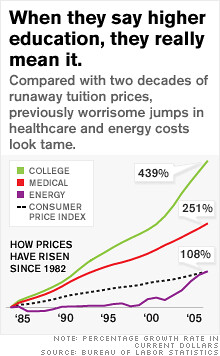
Even way back last August, before the economy was officially in terminal free fall, the issues surrounding a college education were in the news. CNN Money asked, Is college still worth the price?
Most of us have come to understand how necessary a college degree – in anything – is to being able to ‘successfully’ compete in today’s complicated modern world. Yet the costs of a degree – any degree – is soaring up to four times the rate of inflation even as both jobs and salaries for college graduates are shrinking. How much sense does it really make for families (or students, via loans) to pay $200,000 for a degree so s/he can get a job that pays $30,000 a year or less?
In a rational economy the rapid inflation of college tuition would slow, stop or even reverse as consumers – the pool of applying students – shrank in response to the spiraling costs. But for this particular commodity, there can be no shortage of applicants due to the recognized importance of said degree to the entire future of the prospective student. It is much easier to replace light bulbs and take public transportation to work in order to save on electric bills and gasoline than it is to forego a college education because it costs more than a graduating student can expect to earn.
Until the recent financial meltdown families felt fairly secure in their savings for their children’s educations, and college loans were readily available at low interest to finance most of the rest. Now the credit has dried up and the savings have been “liquidated” by failing Banks and Wall Street brokerages.
Some applicants are considering the traditional “Work Your Way Through College” option, but the kind of jobs a student can get part time in a college environment often pay minimum wage or even less. This won’t even buy a single textbook, much less pay a semester’s tuition. At this point the cost in time and energy simply isn’t worth it.
Some families are taking advantage of local Community College offerings, most of which have straight transfer programs to state universities following the first two years’ worth of standard requisites and humanities, which the community systems can offer much cheaper than universities do. In some states as worker re-training has become a serious mandate, the costs of tuition can be less than the amount available to students from the Pell Grant system. That of course doesn’t pay for textbooks (still outrageous) or transportation, but those same community colleges are offering more and more courses on-line so that students can do the work from home without having the transportation and meals expense.
Once in the system and receiving the Pell money, students are then eligible for other grants and scholarships the schools – including community colleges – administer. It takes a semester to get into the system, but this may be the least expensive way to do so. The system tends to follow the student – or even run ahead if she or he is obtaining scholarships for grade point maintenance – to the state universities, which have access to even more resources to help students cover the costs of their education.
The trick these days seems to be to avoid loans if at all possible, to NOT spend the savings the family may have accumulated and might still be worth something, but get the degree anyway. Very few careers actually require incoming hires to boast $200,000 degrees, so anyone not expecting to go into those particular careers should avoid the trap.
There are some good online sources for scholarships and grants as well that parents of high schoolers should be signing up with now, to give their kids the best competitive edge in applying as well as the early advantage of winning. Some of these, including FastWeb will target email alerts to what individual colleges and benefactors are offering in your child’s particular fields of interest as well as preferred schools according to your child’s profile. Peterson’s is a similar service, and either or both are highly recommended, FREE services.
So what’s the bottom line? Do what you have to do to get that degree, it’s still worth its weight in gold (and there aren’t a lot of good jobs around right now anyway). Just avoid debt if you can, take advantage of everything you are capable of using, plot your course carefully, and stick to the plan even if it takes longer to get that degree than you’d originally figured. Good luck and happy scholarship hunting!
Links:
The Cost of College In A Bad Economy
15 Ways to Set Yourself Apart in a Recession
Is college still worth the price?
Should your kid work in college?
Beat the college loan crunch
FastWeb: Scholarships, Financial Aid and Colleges
69 Free or Open Source Tools For Students